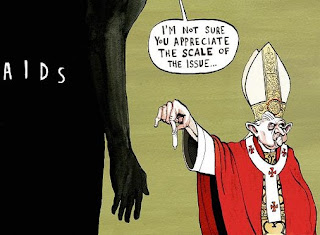The Vatican will host international scientists at a conference on AIDS
in late May, an encounter Church officials hope will help clarify Pope
Benedict XVI’s recent comments on condom use in AIDS prevention, a
Vatican official said.
Following the 28 May one-day conference, the Vatican plans to publish a handbook of pastoral guidelines for Catholic health care workers on AIDS care and prevention, Mgr Jean-Marie Mpendawatu, undersecretary of the Pontifical Council for Health Care Ministry, said on 3 February.
Following the 28 May one-day conference, the Vatican plans to publish a handbook of pastoral guidelines for Catholic health care workers on AIDS care and prevention, Mgr Jean-Marie Mpendawatu, undersecretary of the Pontifical Council for Health Care Ministry, said on 3 February.
Mgr Mpendawatu said the Vatican conference and the subsequent guidelines would take a “global” approach to the AIDS question, and not focus on condoms.
But he said the condom issue would be addressed, in the wake of
the recent debate over Pope Benedict’s remarks and a Vatican doctrinal
note that followed.
In the book-length interview Light of the World, published in November, the Pope said that while condoms were not the answer to the AIDS epidemic, the use of condoms may be a sign of moral responsibility in some specific situations when the intention is to reduce the risk of infection.
He gave the example of a prostitute.
The papal comments sparked discussion and debate, including among Catholic health care professionals.
In December, the Congregation for
the Doctrine of the Faith issued an explanatory note saying the Pope’s
remarks did not signify a change in the Church’s moral teaching or its
pastoral practice, in particular on birth control.
Mgr Mpendawatu said that among those attending the May conference would be leading scientific experts on AIDS, including Michel Sibide, executive director of the Joint UN Programme on HIV/AIDS.
He said
ranking Vatican officials would also address the conference, and explain
to participants in further detail the points made in the doctrinal
congregation’s note.
“Sometimes there is a problem of understanding, of explaining things well: What did the Pope say, really, authentically? What is the thinking of the Pope?” he said.
He said the results of the May conference, which will look at the Church’s global effort to assist AIDS patients, would also represent a contribution to the 6th International AIDS Society scientific conference to be held in Rome from 17-20 July.
Mgr Mpendawatu said the Pontifical Council for Health Care Ministry would probably issue the pastoral guidelines on AIDS care and prevention some time later in 2011, after review by Vatican doctrinal officials.
The pontifical council provides guidance and assistance to Catholic
health care institutions, organisations and individual professionals,
including doctors, nurses and pharmacists.
The council also is preparing to update its “Charter for Health Care Workers,” which dates to 1994.

